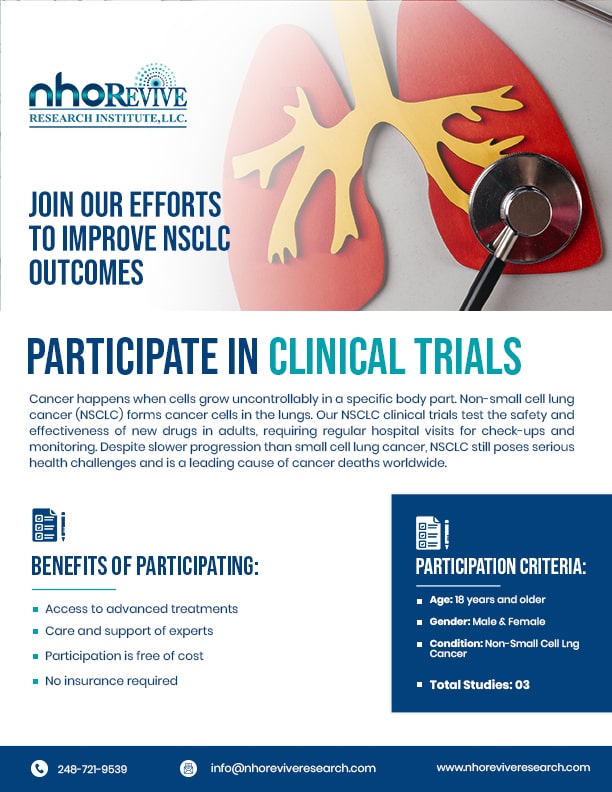Discover the latest advancements in non-small cell lung cancer clinical trials. Enroll now in NSCLC clinical trials to explore and contribute to groundbreaking research.
Non-Small Cell Lung Cancer
Understanding Non-small Cell Lung Cancer Research Study
Explore NSCLC Clinical Tials in Nebraska
Cancer occurs when cells in a specific part of the body reproduce uncontrollably. Non-small cell lung cancer (NSCLC) is a tumor that forms cancer cells in lung tissues. Our non-small cell lung cancer clinical trials aim to compare the effectiveness and safety of the tested drugs in adult participants with implemented potential treatments for lung cancer. This study will assess changes in disease activity and repercussions.
While non-small cell lung cancer symptoms spread slower than small cell lung cancer, allowing for varied treatment approaches, it still poses significant and adverse challenges that remain a leading cause of cancer-related mortality globally. Therefore, to test the drug under study, participants are required to attend regular hospital visits for check-ups, blood tests, side effect monitoring, and to complete questionnaires, evaluating treatment’s consequences.
Eligibility Criteria for Non-Small Cell Lung Cancer Clinical Trials in Nebraska
- Age: 18 years and older
- Gender: All
- Participants must be diagnosed with overexpressing NSCLC.
- Total Studies: 03
*Participation in our clinical study is voluntary, and it’s important to consult with your healthcare provider before making any decisions related to your treatment or care.
*Participation in the clinical trials causes no expenses for you or your private medical insurance. You’ll receive compensation for your time and travel.
About NSCLC
Non-small cell lung cancer (NSCLC) is complex because it grows gradually and silently in the lungs until non-small cell lung cancer symptoms appear. As the most common form of lung cancer, NSCLC poses significant and adverse challenges for both patients and healthcare providers. Individuals suffering from NSCLC often experience symptoms like a persistent cough, chest pain, and shortness of breath.
NSCLC majorly affects lung tissues with the tumor forming and disturbing the large airways. With time and advancement in the disease, it can spread to lymph nodes and other organs, making it more challenging to manage through treatment. Non-small cell lung cancer clinical trials tend to combat this disease through ingenious clinical research studies, potential treatment possibilities that apply to the masses, and persistent patient support.
What to Expect
If you want to volunteer for NHO Revive non-small cell lung cancer clinical trials in Nebraska you must complete If you want to volunteer for NHO Revive non-small cell lung cancer clinical trials in Nebraska, you must complete the form above; our study team will reach out to assess your eligibility. You’ll be invited to the study site for screening, located within a 50-mile radius of where you are now.
The doctors will discuss the trial’s duration and its impact on your cancer treatment. Once everything is explained, participants will be asked to sign an informed consent form. Make sure to go through everything with your provider. We value transparency between our participants and investigators
*You’ll receive study-related care at no cost, including comprehensive physical exams and evaluations conducted by skilled physicians.
Age
18 Year and Above
Gender
All
Location
Nebraska

300
Risk Factors for Individuals with Non-small Cell Lung Cancer
While smoking remains one of the most significant risk factors for individuals with NSCLC, several other risk factors also contribute to the development and progression of this disease. Environmental exposures to radon gas and other industrial pollutants may also increase the susceptibility to the disease. Additionally, a history of radiation therapy to the chest and previous lung diseases like chronic obstructive pulmonary disease (COPD) or pulmonary fibrosis can predispose individuals to NSCLC. Lastly, genetic predispositions and demographic factors may influence susceptibility.
Frequently Asked Questions
Interested in learning more about our research? Explore our frequently asked questions to gain knowledge about this condition.
What is the primary goal of non-small cell lung cancer clinical trials?
The primary goal is to determine if the tested drug is more effective compared to the previous medications used in treating adults with NSCLC and to assess the safety of this drug.
What are the inclusion criteria for NSCLC clinical trials in Nebraska?
This non-small cell lung cancer research study allows all ages from 18 and above, all genders, and volunteers who are diagnosed with NSCLC.
How will the effectiveness of the treatments be monitored?
The effectiveness will be evaluated through regular medical assessments, blood tests, monitoring for side effects, and participant questionnaires. These measures will help determine the impact of the treatment on disease activity and overall health.
What are the potential risks and benefits of participating in this study?
While there may be a higher treatment burden compared to standard care, participants will receive close medical monitoring, regular visits, and thorough assessments. Potential benefits include access to potential treatment and contributing to medical research that may improve future NSCLC therapies.
What happens if I’m chosen to participate in NSCLC clinical trial?
You will undergo a detailed informed consent process that explains the trial protocol, potential side effects, and your rights as a participant. This process ensures you understand all aspects of the study before you agree to participate. This step is not just a pre-requisite but also the most imperative stage of the conducted clinical trial.





